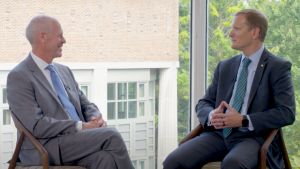By Olivia Robertson
As part of the Distinguished Speaker Series, Thomas J. Steenburgh, Ralph Owen Dean and Professor of Marketing at the Vanderbilt Owen Graduate School of Management, sat down with Michael Mettee, the Chief Financial Officer (CFO) of FirstBank, to discuss his journey to the role, how FirstBank values its local community, how FirstBank is adapting to innovation in the banking industry and his leadership insight.
Meet Michael Mettee, CFO of FirstBank
Mettee started his career in a non-traditional fashion. Upon graduating with his bachelor’s, he went on to work as a stockbroker and financial advisor, only to find that the banking environment at the time was not fit for the career path he had chosen. From there, he transitioned to capital markets, where he found success and continued in that field for more than 10 years.
In 2010, Mettee completed his MBA, which expanded his mindset regarding business and banking and the importance of networking. From there, he was able to pivot towards focusing on a career in banking while implementing a holistic approach to this newfound career path, better understanding how the relationships you form with those around you can have a major impact on your future.
Mettee’s Start with FirstBank
During the COVID-19 pandemic, Mettee was given the opportunity to help FirstBank kick-start its involvement in capital markets. He saw the opportunity as something he could build from scratch and make his own, satisfying his interest in entrepreneurship.
While working with FirstBank to build its capital markets area, he assisted with the migration of FirstBank from West Tennessee to Nashville and participated in the company’s going public. He values these experiences, stating that they are not often experiences that you get working for a larger, more established company.
While working on a Friday afternoon, Mettee received a call from the CEO of FirstBank, Chris Holmes. On this call, Holmes shared information regarding FirstBank’s open CFO position and asked Mettee to serve as the interim CFO, an offer that Mettee accepted. Mettee was successful with the help and support of his peers—so much so that he was offered the permanent CFO position after many other candidates were considered.
Since starting as FirstBank’s CFO, Mettee has overseen two mergers and assisted the company in $100 million in sub-debt offerings. He has also remained in charge of capital markets, allowing the company to make $100 million in mortgage revenue through capital markets activities.
Vanderbilt and FirstBank: A Relationship Rooted in Community
 One of FirstBank’s values, which Mettee emphasized throughout his time speaking with Dean Steenburgh, is its commitment to uplifting its community. Through this commitment to community involvement came its relationship with Vanderbilt. FirstBank was in the market for a community partner in the Nashville area and viewed Vanderbilt as a pillar of the community. From there, the relationship began with the naming of FirstBank Stadium, home of the Vanderbilt Commodores football team.
One of FirstBank’s values, which Mettee emphasized throughout his time speaking with Dean Steenburgh, is its commitment to uplifting its community. Through this commitment to community involvement came its relationship with Vanderbilt. FirstBank was in the market for a community partner in the Nashville area and viewed Vanderbilt as a pillar of the community. From there, the relationship began with the naming of FirstBank Stadium, home of the Vanderbilt Commodores football team.
Throughout this stadium naming process, FirstBank and Vanderbilt realized that they are very like-minded organizations, both committed to community-building, partnerships, and generally being good stewards of their local area. From there, Vanderbilt and FirstBank have assisted not only the Vanderbilt community but the Nashville community as a whole in providing resources surrounding financial literacy and banking.
“We really feel like local matters, for us, that’s local decision-making done by being in your community,” said Mettee. “When you come to see someone at FirstBank when you need something done, they can make that decision right there for you. We’re side by side working and bettering the community—that’s very important.”
Innovation in the Banking Industry
When Dean Steenburgh asked what trends Mettee noticed in the banking industry, Mettee did not hesitate to respond with innovation regarding financial technology (FinTech), the largest and most significant recent trend. He noted that what has been primary in recent years is finding new ways to make banking easier, with users preferring more digital ways to access and manage their finances.
“Our children will never go into a bank branch. Those things are changing, the dynamics are changing,” said Mettee.
Knowing this, Mettee and FirstBank realized that automation and ease of use in banking are things they needed to explore and move forward with. They were committed to figuring out how to make banking easier and provide the same services they have been providing, but with new technology that streamlines the user’s ability to access what they need. However, one area that they are staying true to during this commitment to innovative change is the importance of people; FirstBank is dedicated to ensuring that though their processes may become automated to remain up to speed with the needs of users, they will remain a person to person business, making it just as easy for their customers to speak to a real person in a timely manner as it is for the customer to access their banking services digitally.
When choosing to jump into innovation, Mettee and FirstBank understood that they could not match the innovation the Silicon Valley-esque banking and financial service organizations were dishing out. Understanding that this ability is crucial in groundbreaking innovation, they chose to work with The Wond’ry at Vanderbilt, a University organization dedicated to collaboration and inclusive, fresh innovation to assist in making their ideas come to life. Working with The Wond’ry has allowed FirstBank to capitalize on trends in FinTech by implementing innovative ways to meet the wants and needs of bank customers, expanding the reach of their customer base.
While stating that FirstBank has received countless offers and inquiries from FinTech organizations looking to work together, Mettee provides insight regarding what guidelines they use to evaluate which FinTech services to invest in, with many of these guidelines also applying to choosing which innovative organizations to work with. They rigorously assess the offers they receive using these five questions:
- Does this technology have the ability to replace something that FirstBank is already doing?
- Is this technology something that they can have equity in?
- Does this help FirstBank to serve their local community better?
- Is the service that this FinTech is enhancing something that FirstBank is already good at, and how does the applicable FinTech enhance that service?
- Is this something banking-related that FirstBank can monetize?
Leadership Tips from a Chief Financial Officer
 Dean Steenburgh insisted Mettee share leadership insights from his perspective as someone who climbed the business ladder to become CFO of one of the most prominent financial institutions in the United States, to which Mettee responded with three tips that he believes led to his success.
Dean Steenburgh insisted Mettee share leadership insights from his perspective as someone who climbed the business ladder to become CFO of one of the most prominent financial institutions in the United States, to which Mettee responded with three tips that he believes led to his success.
Remain Willing to Take On the Next Challenge
Mettee stresses the importance of playing the long game when it comes to your career, stating that many people are more concerned with short-term returns rather than long-term opportunities. To bolster this, he states that it is important to keep in mind that it may take a while for something to pay off. However, when evaluating a situation or offer that is presented to you, it is crucial to evaluate which is better—the immediate satisfaction you will receive from a short-term payoff or the long-term career benefits that patience surrounding the situation may offer.
In Mettee’s eyes, it is important to take control of your career, stressing that it is for you, not someone else, to manage. Therefore, being willing to take charge of your career while understanding that not all career paths are the same, though they may have similar outcomes, is vital for career success.
“The closest to the broom sweeps the floor”
In this piece of insight, more from a leadership rather than a career-building perspective, Mettee discusses how important it is to be willing to do any job or task necessary. He provides a personal anecdote of this, sharing that he has never, and will never, ask one of his peers to complete a task or do a job that he is not willing to do himself. To him, this is an easy rule to follow, simply by remembering three words, instilled in us from childhood: “Be good people”.
It’s about who you surround yourself with
Finally, Mettee shares that a way to set yourself and others up for success is to surround yourself with people who are better at their jobs than you are. If one person could do every job, then there would not be a need for a team. However, this is not possible, and Mettee notes that the best way to ensure that you and the people around you are doing the best job that they can do is to ensure that you surround yourself with people who are smarter than you, and whom you can learn from—experts in their field whom you can trust to do their jobs correctly, and better than you could, so you can learn from them and have a mutually beneficial relationship by complimenting each other’s skill sets.
All in all, success to Mettee is driven by three high points: remembering where you came from, being willing to take on a challenge, and simply being a good person that surrounds themselves with like-minded, good people. It is clear that these are guidelines that Mettee manages his own life and actions with, shown through his commitment to his community, his commitment to those he works with, and his willingness to take on what may seem to others to be a daunting task, driven by his ability to see the long-term benefits.